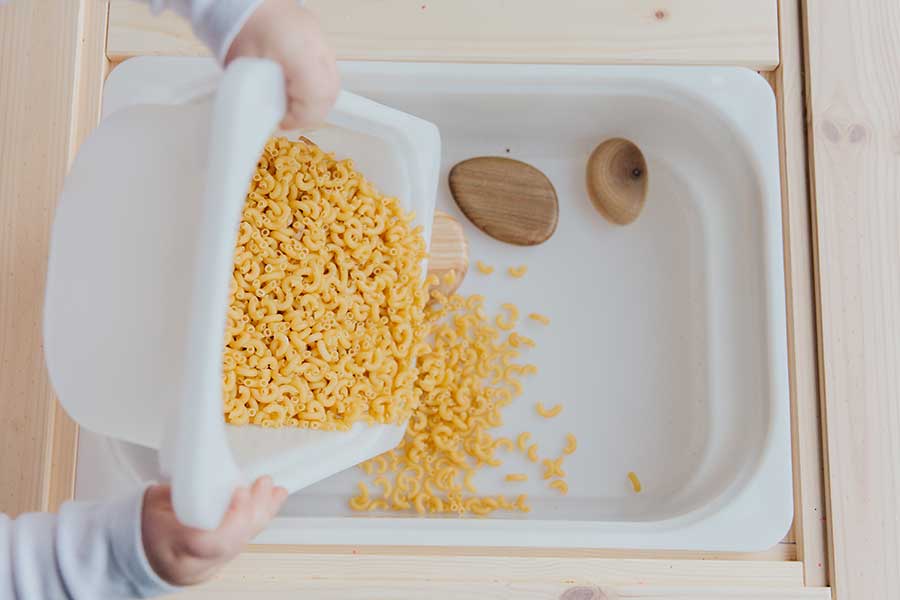
17 Nov 25 easy to make or do sensory activities for you and your autistic preschool child
The school holidays are long, and parents often struggle to keep young children with autism occupied. We recommend that you pre-prepare at least 25 fun sensory activities that you can rotate over the upcoming festive season. Engaging in sensory activities can be incredibly beneficial for all autistic preschoolers.
Here are 20 easy-to-make or do sensory activities for you and your autistic preschool child:
- Sensory Bins: Create themed sensory bins with materials like rice, beans, sand, or water beads for tactile exploration. You can also make jelly sensory bowls or gloop-bowels.
- Homemade Playdough: Make homemade playdough with different textures using ingredients like rice flour, cornstarch, and sand.
- Sensory wall: You can attach a wide variety of textured materials like fur, fake grass, plastic bubble wrap, twigs, and sticks to a wall that you child can play with
- Bubble wrap project: Use plastic bubble wrap to make textured art projects.
- Bubble wrap popping: let your child pop the bubble wrap one by one.
- Kinect sand: You can either make your own from a recipe on the internet or you can buy Kinect sand for your child to play with
- Garden Scavenger Hunts: talk about a walk-in nature to explore different textures, smells, and sights outdoors.
- You can take coloured plastic container lids or bottles or make goggles with cellophane and toilet roll inners – let your child look through them, so to see different colours in the garden.
- Rake up leaves and throw them in the air whilst your child is lying watching them or spinning in circles.
- Lie under a tree and at home the leaves move and dance in the wind.
- Sensory Walk: Set up a sensory walk with different textures underfoot, such as grass, sandpaper, or bubble wrap.
- Sensory Bottles: Create sensory bottles with gloop, glitter, beads, or rice to provide visual and auditory stimulation.
- Experiment with scented playdough, scented markers, or scented stickers to engage the sense of smell.
- Music and Movement activities can be very sensory for your child. Play music and encourage dancing or moving to the beat, which can be both auditory and tactile.
- Arrange various water play activities in the garden – even just watering the flowers will work perfectly fine.
- Running through sprinklers in the backyard.
- Bake mud pies or create other messy play art activities where you allow your child to explore messy art activities with finger painting, shaving cream, or pudding, mud, or clay.
- Baking can be very sensory as it involves the child using their hands to mix or knead dough.
- Balloon Play: Inflate balloons and engage in activities like balloon volleyball or sensory exploration by rubbing them for static electricity.
- Bean or rice nature sensory bin / Tupperware container filled with natural materials like pinecones, leaves, and rocks. You can add a few affinities-based toy figurines into the mix as well.
- Play tasting games and help your child learn different flavors like sweet, savory, or spicy. If you want to turn this sensory activity into an ever-bigger learning experience, ask your child to show you on a picture how the taste makes them feel (or for verbal children ask the child to describe if the taste makes them feel happy or sad).
- Play games like bean bag toss or sensory hide-and-seek with bean bags.
- You can easily make a few DIY Sensory Boards with textured materials like sandpaper, Velcro, and fabric swatches that your child can sit and play with.
- For younger children invest in a few sensory story books. You can also incorporate sensory elements into storytelling by using props, scents, and textures to enhance the narrative if the child is a bit older.
- Shaving cream painting or drawing – all you need is some of Dad’s shaving cream (moisturizer also works) a smooth non-porous surface and tiny hands.
Remember that all sensory-based activities should be enjoyable and that they should not in any way be overwhelming for the child, so be sure to provide a calm and safe environment for exploration and play.

